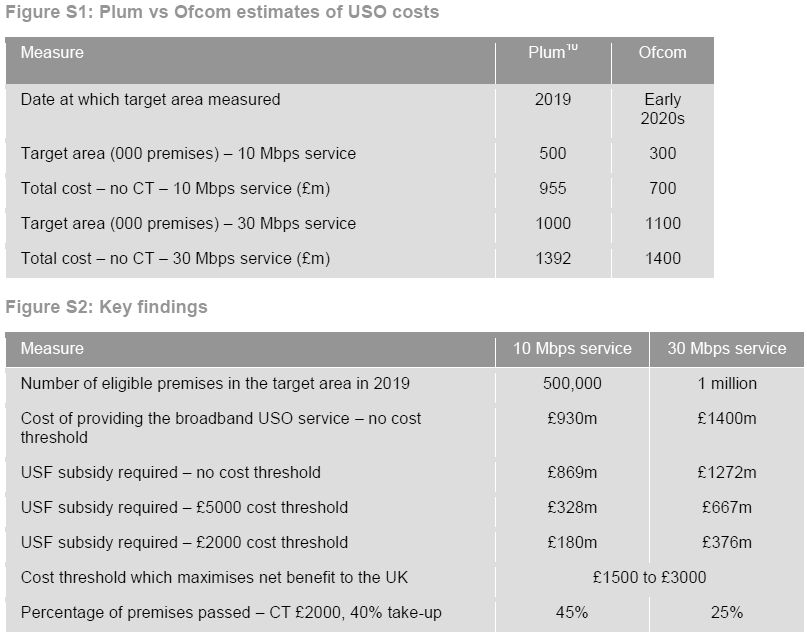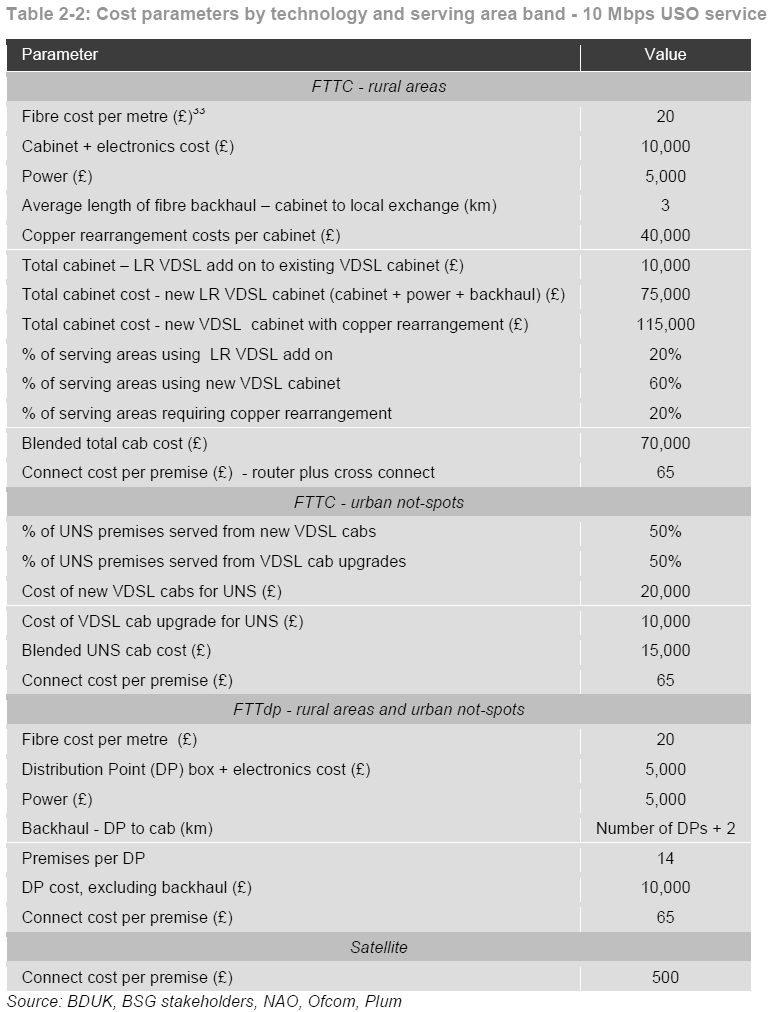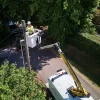UK Broadband Stakeholders Group Reveals the Cost of a 10Mbps USO
The Broadband Stakeholders Group, which acts as a think-tank for government policy, has predicted that the cost of implementing the UK’s legally-binding 10Mbps Universal Service Obligation (USO) for broadband speed could be anything from £180m and up to £930m; depending upon the cost threshold.
At present the Broadband Delivery UK programme hopes to make fixed line “superfast broadband” (24Mbps+) speeds available to around 97% of the United Kingdom by 2020 and the Government’s proposed 10Mbps USO is thus primarily intended to tackle that remaining 3%.
Ofcom has of course already conducted an analysis of the technical options and costs of implementing such a USO (here), which found that it could cost anything from around £700m and up to £1.1bn to implement; depending upon aspects like technology choice and how many premises might need to be served.
Advertisement
By comparison the BSG’s study – ‘The impacts of a broadband USO in the UK‘ (Plum Consulting) – is designed to complement Ofcom’s report and as such it makes some different assumptions. For example, it estimates that, without any cost threshold constraints (a threshold caps the money spent on individual premises), it would cost £930m to provide a 10Mbps service to some 500,000 premises in 2019 (i.e. the number of premises not be able to receive speeds in excess of 10Mbps).
Ofcom has already proposed that a new Universal Service Fund (USF) may need to be established in order to help subsidise the USO because otherwise there’s a rising risk of social exclusion, such as through hefty costs being passed on to end-users. However we don’t yet know where the money for this might come from (public subsidy, industry levy, supplier investment, end-users etc.).
One of the BSG’s least expensive models estimates that, at a cost threshold of £2000 per connected premise with 300,000 premises, the USO might come in at just £180m. It’s worth pointing out that the existing USO for telephone lines already has a cost threshold of £3,400 but the BSG warns that this should not be used as a comparison because “the benefits derived from network use for voice and for broadband are different.”
Richard Hooper, Chair of the BSG, said:
“This reports rightly highlights the complexity of designing a broadband USO that is both cost-effective and built to achieve digital inclusion across the country. Our report adds to the evidence base on the best way that a USO can positively contribute to the goal of universal good quality broadband and we look forward in engaging further in this debate with Government.”
The BSG’s estimates were done before the Government dropped a proposed 30Mbps USO (here and here) and so we get to see the estimates for that too, which affords some useful context.
Advertisement

This is all based on using a mix of Satellite, FTTC (VDSL2) and some FTTdp connectivity. The latter is a bit odd since FTTdp was initially mooted by Openreach (BT) for G.fast but this has since been side-lined by a cheaper street cabinet dominated approach, at least initially.
On top of that the BSG considered a monthly data throughput allowance of between 10GB to 200GB per month (10GB where Satellite is used) and consumer take-up of the service ranging from 40% to 80%. However the study noted that the USF subsidy required is also very sensitive to the data throughput required.
For example, with a constrained throughput of 10GB per month it would be possible to connect all premises in the target area for less than £100m regardless of the cost threshold (perhaps partly because the Government could cheat with inferior Satellite). However if you pump this to 100GB+ then the subsidy increases substantially – to just under £400m at a cost threshold of £5000 and to £869m if there is no cost threshold.
Advertisement
One obvious problem here is that average data use is currently a lot higher than 100GB. For example, Ofcom found that the average fixed line broadband user gobbled 153GB per month and this rises to 169GB for those with superfast packages. By 2020 that figure will surely have more than doubled.
Nevertheless the analysis finds that the cost threshold which maximises net benefits to the UK is likely to sit between £1,500 and £3,000, although much will depend upon what economic benefit the government assigns to connecting an additional premise in the target area. The USO also starts to “generate net economic losses for the UK” at a cost threshold of around £10,000.
As such the report proposes that, where a premise exceeds the reasonable cost threshold, there should be two options.
Options for Expensive USO Premises
* First premises and communities should be able to pool their demand and if necessary, pool their individual additional contributions to costs over and above the individual cost threshold. For example it may be that to serve one premise would exceed the cost threshold of say £2500 but that the total cost of serving both that premise and three other neighbouring premises would be below £10,000. This of course requires demand aggregation.
* Secondly, if premises are unable to aggregate demand in this way, then they should be offered a fall-back option. This would almost certainly be a wireless solution, and likely a satellite solution, given the dispersed nature of the target premises.
The Government currently intends to launch a final public consultation on the USO, which is expected after next month’s election and this will set out what sort of speeds, funding, timescale and technology approach they have decided to take. Today’s new study will no doubt help to inform the final decision on that.
At this point we’d like to share some of the cost assumptions being used in the study as we know there are a few other people who will find this to be quite interesting.

Mark is a professional technology writer, IT consultant and computer engineer from Dorset (England), he also founded ISPreview in 1999 and enjoys analysing the latest telecoms and broadband developments. Find me on X (Twitter), Mastodon, Facebook, BlueSky, Threads.net and Linkedin.
« SpaceX Pledge 1Gbps Speed and 25ms Latency from its LEO Satellite Broadband

















































Comments are closed